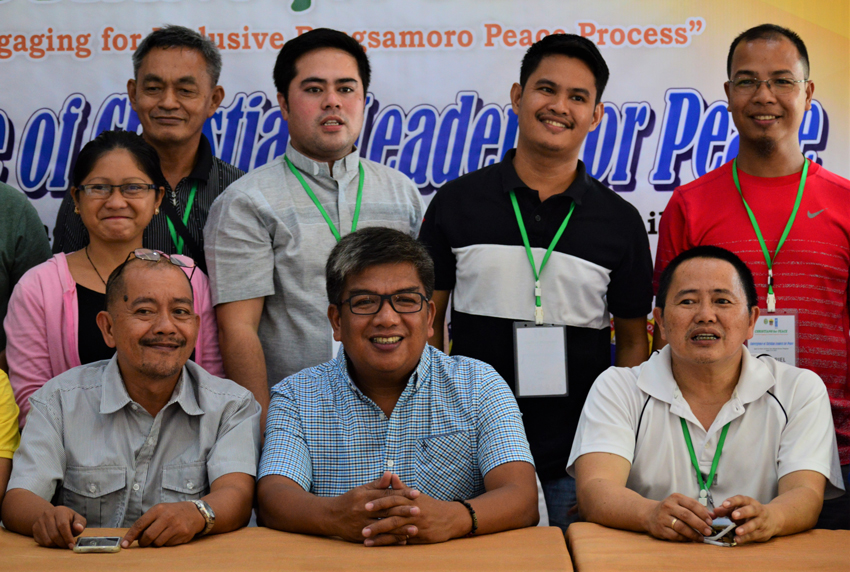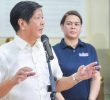
The Christians for Peace (CFP) is working to have the Christian communities included in the political process of the future Bangsamoro Autonomous Region in Muslim Mindanao (BARMM) which will replace the Autonomous Region in Muslim Mindanao (ARMM) through consensus-building held in some areas in Mindanao. In the photo during a recent CFP forum are, seated from left, ARMM deputy governor for Christian Affairs Edgardo Ramirez, ARMM Gov. Mujiv Hataman, and vicar general of the Prelature of St. Mary’s in Marawi City Fr. Ramonito Torres. (Jigger J. Jerusalem/davaotoday.com)
CAGAYAN DE ORO CITY, Philippines – Not wanting to be just a mere bystander once a new Bangsamoro political entity will be created following the enactment of the Bangsamoro Organic Law (BOL) recently, a group of Christian church officials is pushing for the crafting of policies that will be inclusive to all who are living in the Muslim-dominated territories in Mindanao.
Fr. Ramonito Torres, vicar general of the Prelature of St. Mary’s in Marawi City, said that while they support the passage of the BOL and the eventual creation of the Bangsamoro Autonomous Region in Muslim Mindanao (BARMM), they also want other stakeholders, particularly the Christian communities, to have a voice in the new political jurisdiction that they will belong to.
Torres said they have organized the Christians for Peace (CFP), an initiative aimed at gathering all the concerns affecting not just the Roman Catholics but also members of other Christian churches that are based in the provinces covered under the BARMM.
The CFP, Torres said, is a venue for Christians where they can collectively bring their voice to the future BARMM government as he acknowledged that the Moro peoples will be the ones taking the helm of the new Bangsamoro jurisdiction.
“It’s a reality that we Christians are the minority in areas affected by the BOL,” Torres said on the sidelines of a forum organized by CFP held in a beach resort in Opol town, Misamis Oriental, recently.
Based on the 2015 census data from the Phil. Statistical Authority, the total population in the Autonomous Region in Muslim Mindanao (ARMM) is 3,781,387, with 3,451,644 or 91.3 percent are Muslims. Only 312,441 persons living in the ARMM were considered non-Muslims, which would include the Christian population.
The present Muslim autonomous region consists of the provinces of Basilan, Lanao del Sur, Maguindanao, Sulu, and Tawi-Tawi.
He said a provision in the BOL welcomes the Christian community as a whole in the process of governance into the BARMM.
“What is the participation of the Christian community in the Bangsamoro? [This] is what we are gathering by way of consensus-building,” he added.
CFP has been holding consensus-building activities in North Cotabato, Maguindanao, Lanao del Norte, Lanao del Sur, Basilan, and Tawi-Tawi.
The result of these series of gatherings will then be submitted to Cardinal Orlando Quevedo, the archbishop of Cotabato, and Archbishop Antonio Ledesma, head of the Archdiocese of Cagayan de Oro, who was tasked with facilitating the inter-religious dialogue for the whole of Mindanao.
Once Quevedo and Ledesman give the document their stamp of approval, the “Christian policy agenda” will be endorsed to the Moro Islamic Liberation Front (MILF) leadership.
In an initial report provided by CFP organizers to reporters, among the issues raised by the Christian communities are the equitable representation in the Bangsamoro parliament other than the two seats reserved for Christian representatives; the issuance of anti-discriminatory policy regarding hiring and appointment of Christian professionals in the Bangsamoro offices; strict implementation of election laws; protection of land ownership and settlement of land disputes, among others.
Torres said it’s important for the MILF to know the stand of the Christians in this new political landscape.
“Our fear in going through the transition is that of having the wrong information and non-preparedness in the changes that will come out and being left out,” Torres.
He added that rather than adopting a wait-and-see attitude, being pro-active and participative is the proper course of action in this situation for the Christians.
But for the BOL to be fully understood by both Muslims and Christians living the Bangsamoro areas, he said a series of dialogues must be held on the ground, before BARMM could be established within the existing Autonomous Region in Muslim Mindanao.
The role of the Christian communities in BARMM, he said, is “to journey with” or to be with their Muslim neighbors.
“In Marawi, Christians are journeying with Muslims in their pain and struggles,” Torres said, referring to the plight of the residents of Marawi who not only lost their relatives and properties but were displaced, as well, due to the months-long conflict that erupted between armed extremists and government forces last year.
“It’s not just peaceful co-existence anymore but convergence of Muslims and Christians. They have to help each other,” he added.
Fr. Clifford Bayra, the social action director of the Archdiocese of Cotabato and CFP co-convener, said it is important for the Christians residing in the Bangsamoro areas to welcome the new political region.
“We aim to see what kind of positive participation can be made to the ongoing process of governance that we have built from the past,” Bayra said.
The series of consensus initiated by CFP is seen as a “sustainable mechanism with the right information” and a way for non-Muslim residents to iron out their issues and concerns that made them biased amid the Bangsamoro political dynamics, said Fr. Rogelio del Rosario, an official of a Catholic-run school in Malabang town, Lanao del Sur.
“I think we have to go back to where we were before the Spaniards came – that we had some harmony with the different tribes,” he said.
“Even before we were Christians, [even before] we were Filipinos, we had a relationship and we were existing in a relative harmony. So, I think we have to go back to recover that relationship before the Spaniards came and the Americans and also the Japanese and all that,” del Rosario added.
For his part, Edgardo Ramirez, ARMM deputy governor for Christian affairs, said that the BOL has allocated two seats each in the BARMM parliament for the Christians or the “settlers,” indigenous peoples, professional, youth, and women.
“It’s already a signal that there is an opportunity for Christians to participate in governance, in terms of policy development because it’s part of the parliament. We have two representatives from the Christian community, that would mean they can participate in terms of policy decision-making,” Ramirez said.
Meanwhile, ARMM Gov. Mujiv Hataman said the plebiscite will have the ARMM as the core territory and the basis for the majority votes is region-wide.
In Lanao del Norte, the proposed inclusion of six of its towns in the BARMM will be decided on by the entire province through plebiscite.
These municipalities are known to have strong MILF presence but the province’s political leaders had already expressed their opposition to the planned inclusion.
Lanao del Norte Gov. Imelda Quibranza-Dimaporo, right after the signing of the BOL, has made it clear that they will not allow a part of her political jurisdiction to go to the BARMM.
Quibranza-Dimaporo’s son and the province’s 1st District Rep. Mohamad Khalid Dimaporo said Lanao del Norte has been consistent in its stand against the move to include Tagoloan, Balo-i, Pantar, Munai, Tangcal, and Nunungan in the new Bangsamoro region. (davaotoday.com)










